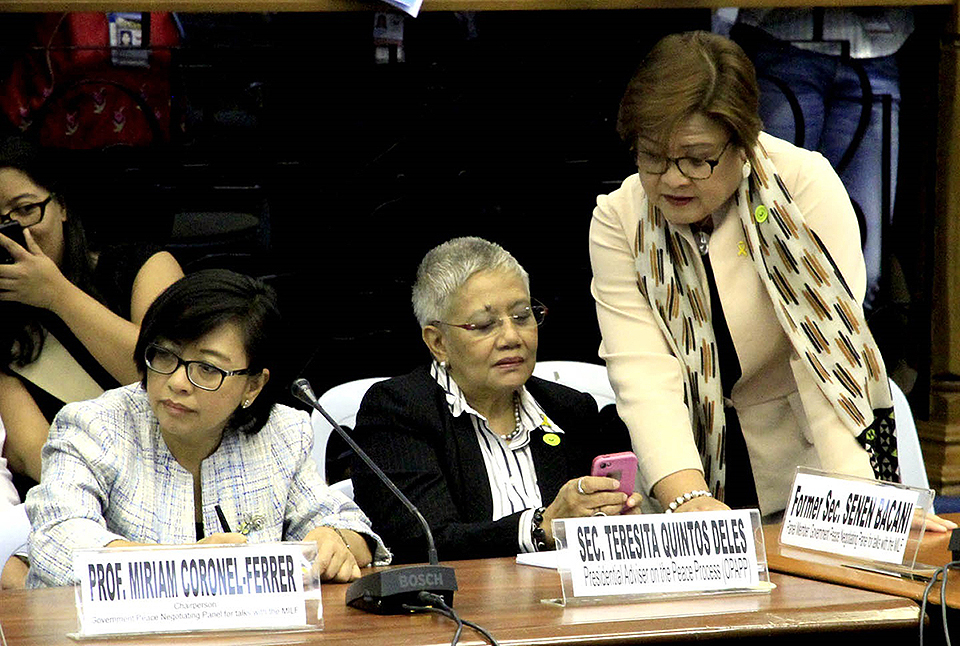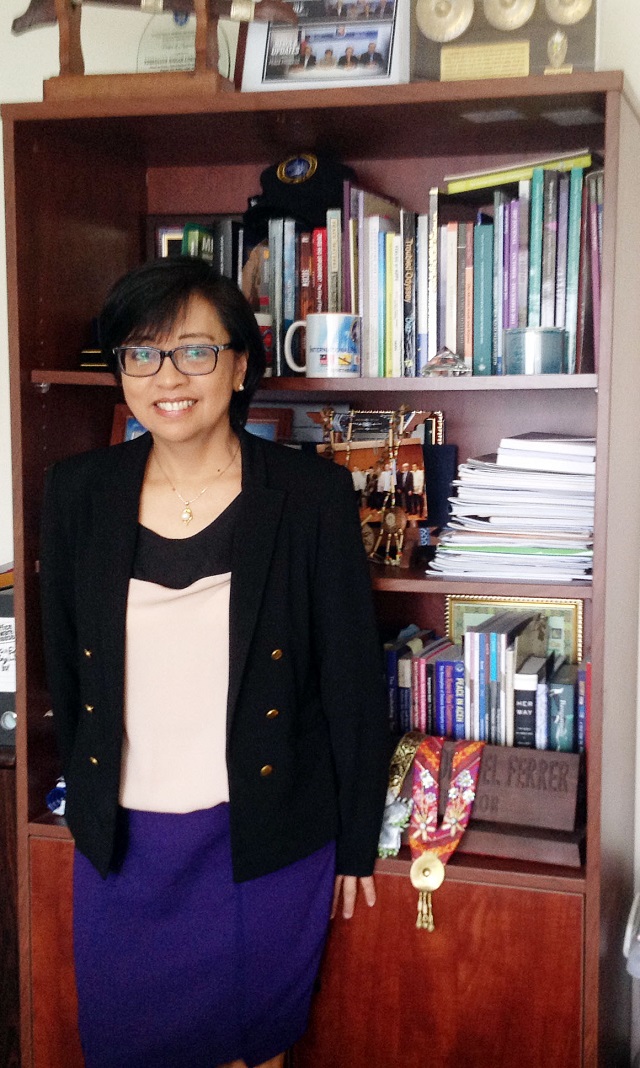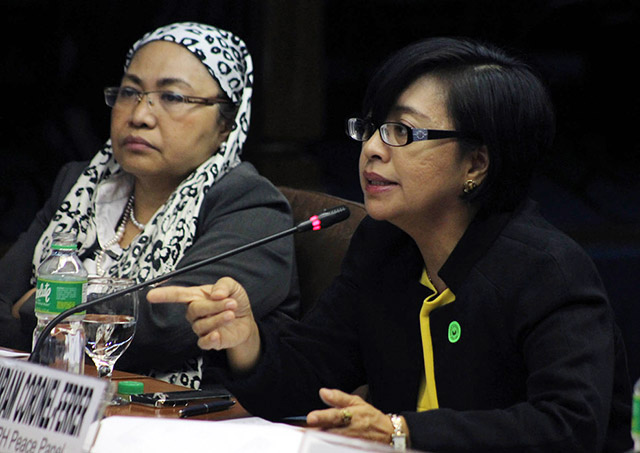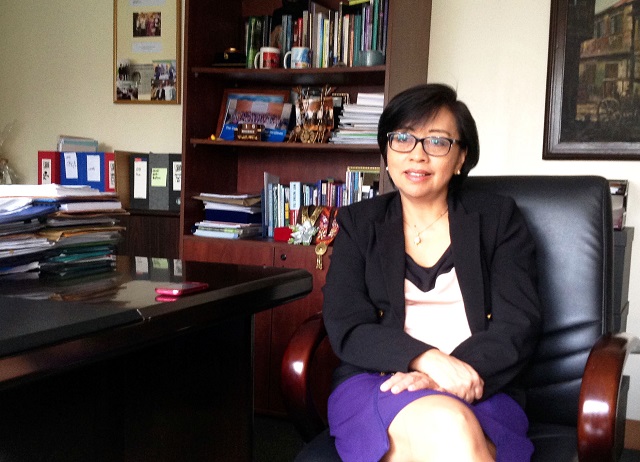Filtered By: Lifestyle
Lifestyle
Prof. Miriam Coronel-Ferrer: A woman for peace
Text and photos by LEN CRISTOBAL

Professor Miriam Coronel-Ferrer (left) with presidential adviser on peace process Secretary Teresita Deles and Justice Secretary Leila de Lima during a break at a Senate inquiry on the Mamasapano clash, February 9, 2015. Albert Calvelo/PRIB
A political science professor at the University of the Philippines who joined the peace panel in 2010, Coronel-Ferrer’s role is not confined to face-to-face negotiations. She is also responsible for the groundwork of peacebuilding, with her office working to ensure that concerned parties reach a consensus on such matters as the draft for the Bangsamoro Basic Law (BBL).
“All of these, it’s a lot of work. Just doing the policy studies and the consensus-building and then explaining it to the public. Plus engaging the constituency of the MILF,” she told GMA News online in an interview.
The bloody Mamasapano incident inevitably slowed the progress of the peace-building between the government and the MILF, but there was still gentleness in Coronel-Ferrer's voice when she talked about how her panel is trying to ease the impact of the incident on the peace process while facing calls for her replacement.
“Despite all these negative criticisms, yung iba pa nga, gutter-level na, we’re staying the course because we believe it is right—in the same way that we stayed the course in the struggle against the dictatorship and also in the same way that I stayed the course when I stopped believing in the wisdom of armed struggle in the 1980s,” she said.
Courage in the Coronel family

Coronel-Ferrer in her office. 'We're staying the course because we believe it is right,' she says. '
“My parents were very liberal. They allowed us to pursue our own interests. My mother was very sure that she didn’t want me to be an ordinary housewife; sinabi niya 'yan sa amin,” she said.
The sisters were actively involved in political movements during the Martial Law. Miriam said that their father, who used to be a lawyer for generals, worked very quietly to keep them safe.
Miriam says she lived a “very fulfilled” life in her youth, crediting not only to her parents but also the foundation she built on her friendship with her sister and cousins, who all went to the University of the Philippines at Diliman with her. “We would go out together. Cubao pa lang pinupuntahan namin nun e. And around QC, may folk houses. Masaya yon kasi para kaming barkada,” she said.
Gymnastics mom
Her parents’ ways seem to have trickled down to Miriam’s own parenting style. According to her, if there are soccer moms, then she was the gymnastics mom, because her daughter was engaged in competitive gymnastics while growing up. “I even headed the Philippine Gymnastics Institute kasi we needed to put up our own institute to raise the funds…That’s something we do not regret even if we had to spend a lot of money and effort para dun sa kanyang hilig,” she said.
Miriam married right after college—something she has never regretted, saying that now she can do more things because her children are already grown. Today, she also enjoys being a grandmother to three girls.
When asked how her family perceives her job, she said they fully support her because she has always been politically active.
“Ang tawag nga sa husband ko e ‘Most Supportive Husband’. He cooks, goes to the market, takes care of the household. He is a multi-tasking person. He earns money for the family and takes care of the household, so swerte,” she laughed.
But she also admits that her family is now more worried about her security, noting that there have been hostile reactions and even threats since the Mamasapano clash.
As good as any man

Coronel-Ferrer and presidential assistant on Muslim concerns Usec. Yasmin Busran-Lao (left) explain details of the Bangsamoro Framework Agreement during a Senate inquiry on February 18, 2014. Benjie Castro
“I was very fully supportive of the peace negotiations na binukas ni Cory Aquino sa MILF at that time tsaka sa CPP/NPA/NDF. Unfortunately, hindi ito nagprosper. Nagkaroon ng ceasefire, series of coup d’états…Nagkaroon ng conservative swing. But the next admin, si President [Fidel] Ramos, tinuloy-tuloy niya 'yan [peace negotiations]. Nasustain ko na yung pagsubaybay. I was able to sustain that both as an academic interest and advocacy,” she recalled.
In 2012, Coronel-Ferrer was appointed the first female chair of the peace panel. She had her work cut out for her, having to dispel doubts about her authority as negotiator.“They [MILF] had to adjust to the fact that I was a woman kasi all the time ang kausap nila mga lalaki—parang unknown quantity eh, na ang magiging chair ay babae,” she said. “You have to show that you can be as good as any man, if not better.”
One momentous event for her was the signing of the Annex on Revenue Generation and Wealth Sharing of the Framework Agreement on the Bangsamoro in Malaysia in July 2013. She recalled that the meeting ended at 11 p.m., when only four women, including herself, were left inside the room since some of the male members had to leave. Although she is not disregarding the efforts of their male negotiators, she is proud that an all-women team finished the job.
Women in peacebuilding

'[The MILF] had to adjust to the fact that I am a woman...You have to show that you can be as good as any man, if not better.'
“We want the women who have been affected by the conflict and played all these important social and public roles in responding to the demands of the situation [to be recognized].”
The women of the MILF are among those for whom Coronel-Ferrer wants recognition—women who have openly shared their aspirations for their communities and families with them during an all-women meeting.
When GMA News Online asked why women should be active in peace negotiations, she said, “We bring in the perspective. Other women look up to us, they tell us what they feel they need. If I were a male officer of the GPH, it won’t be easy for them, especially for ordinary women, to come, embrace me, and shake my hand and tell me their stories.”
Coronel-Ferrer believes it is her responsibility to help bring forth other women’s perspectives. This openness, for Miriam, has allowed them to come up with a comprehensive peace agreement that they hope is gender-sensitive and mindful of the rights and welfare of the women involved. — BM, GMA News
More Videos
Most Popular




